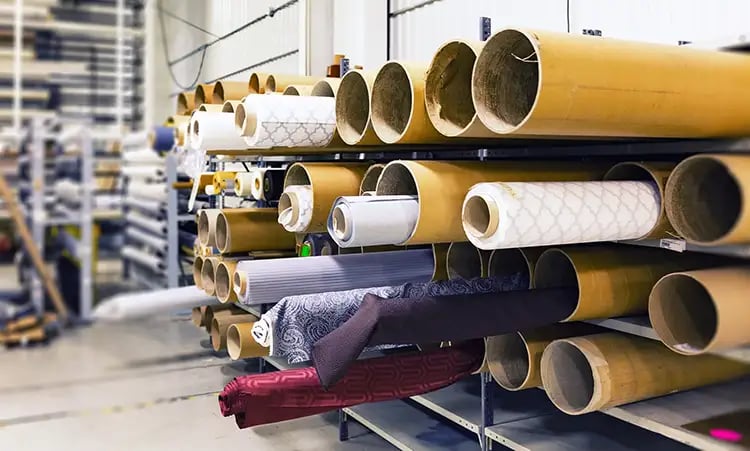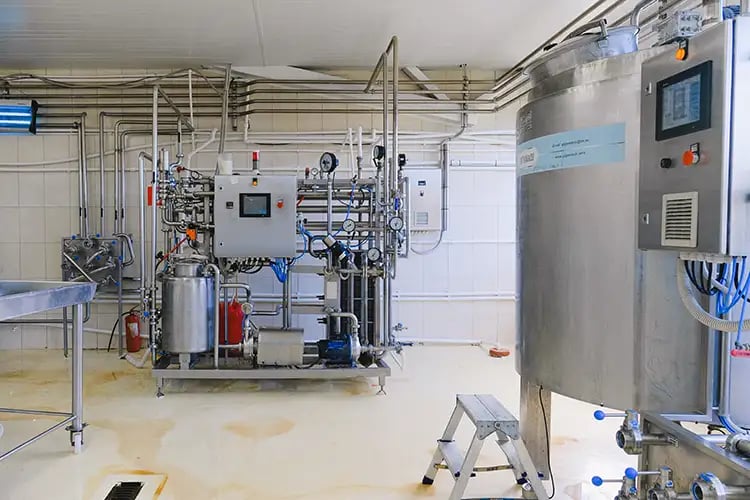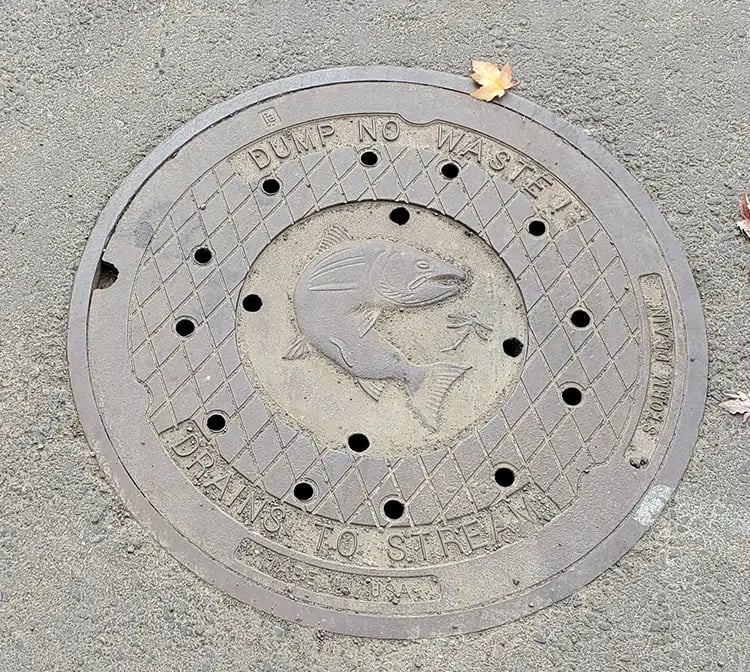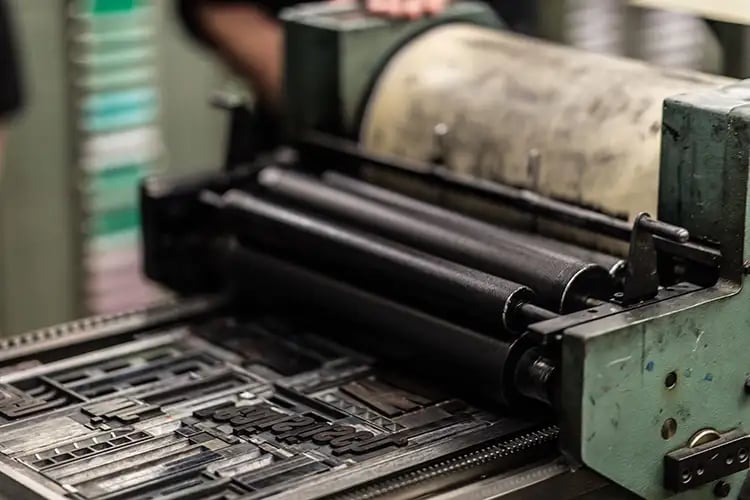Learn when you do and don’t need an individual NJPDES process water or stormwater permit in New Jersey.
If you have an industrial operation in the State of New Jersey, one term you may have heard kicked around before is a “stormwater permit”. Long story short, if you have certain types of industrial operations here in the Garden State, you may need what’s called a NJPDES permit.
Whether this is news to you, or you already know and just need a bit more information, this type of environmental regulation can mean very different things for different types of industrial facilities across New Jersey. For many types of industries, there are what’s called NJPDES Industrial Stormwater GENERAL Permits, while for other industries, there are no specific permits available. What about an MSGP or something like that?
If you’re wondering about these kinds of things and how they apply to your operation in New Jersey, you’ve come to the right place. Let’s dive in and discuss NJDPES permits, and when you may or may not need an individual stormwater permit.
What are stormwater permits?
If you’re not up to speed on these regulations, check out the following stormwater permit-related articles for a quick primer on the subject:
To get more specific (and assuming you either already know a bit or checked the above articles out), we’re talking about New Jersey’s NPDES permitting program, which has permits called NJPDES permits (we call them nuh-jip-dees). Again these are discharge permits for industrial facilities with stormwater and (and with often great difficulty) process water discharges. If you're unsure what that means, check out Stormwater vs Process Water - What's the difference? and What can I discharge with an NPDES Permit?
To get technical, and if you don't read ahead, there are NJPDES permits for other things too, such as municipalities and Newark Airport, but for now, we're focusing on industrial facilities.
Individual Stormwater Permits vs. General Stormwater Permits in New Jersey
To start off, we should probably take a quick look at what Individual Stormwater Permits are. There are two different kinds of NJPDES permits in New Jersey: General Permits, and Individual Permits.
General NJPDES Stormwater Permits are available for certain specific industries and types of businesses. For example, wood recycling facilities in New Jersey have their own specific general permit (known as the R7 permit), while concrete manufacturers in New Jersey have a different general permit (the CPM permit).
Individual NJPDES Permits, on the other hand, are tailored to a particular operation. If your operation is a “regulated facility” (more on regulated facilities in a moment) and doesn’t fall under one of the industry-specific General Stormwater Permits, you’ll probably need to seek coverage under an individual permit instead.

What about an MSGP in New Jersey?
Long story short, there isn't one.
New Jersey is one of the few states to truly not have a multi-sector general permit. Sure, some will argue the 5G2 NJPDES Stormwater Permit is a Multi-Sector General Permit here in New Jersey, but I don't buy it. The 5G2 fits an extremely narrowly defined type of facility - one that's entirely indoors and/or undercover, including all your material, storage, stockpiles, processes, equipment, etc. This is so restrictive that most industrial facilities we've worked with can't use the 5G2 stormwater permit.
Let's say you operate a manufacturing facility and you truly are 100% indoors. The only thing outside the confines of your building's footprint is a compacting dumpster and parking areas. In this instance, yes, most likely, the 5G2 would work for you, regardless of your industry. And in this case, yes the 5G2 permit would be considered a type of MSGP here in New Jersey since, more or less regardless of what you do inside your building, you could use this permit. In a sense, a multi-sector general permit, albeit extremely restrictive.
However, if you do ANYTHING outside, you can't use the 5G2 permit. Have an uncovered dumpster? A stockpile of sand? Stack of metal sheets used for fabrication? Maybe you store clean & empty drums or plastic totes outside. Maybe you do some simple process outside, like transfer material or product into another container. Maybe you keep a piece of mobile, heavy equipment outdoors. Maybe you have an emergency backup generator in case the power goes out. These are all things that could prevent you from obtaining the 5G2 stormwater permit here in New Jersey.
So long story short, there's sort of a Multi-Sector General Permit in New Jersey in the form of the 5G2 NJPDES permit, but it's not usable at many industrial facilities out there.
In other states, many of these types of facilities that could use the 5G2 permit could qualify for a non-exposure certification. We often call the 5G2 stormwater permit the stormwater permit for facilities that don't need a stormwater permit.
The ones that can't use the 5G2 need an individual NJPDES permit, again whereas in other states, an MSGP would likely cover you.
How do I know if I need an Individual Stormwater Permit in New Jersey?
Here are the “baseline” criteria for NJPDES applicability:
- “Regulated facilities”; who:
- Discharge stormwater associated with industrial activities to surface and/or groundwaters,
- Do not discharge to a Combined Sewer System (CSS),
- Are ineligible for the available industry-specific general permits, and
- Cannot demonstrate “permanent no exposure”
So, if you meet all of those criteria, the answer is yes, you do need an Individual Stormwater Permit in the State of New Jersey.
What types of operations are considered “regulated facilities”?
Regulated facilities are typically involved in some industrial (or commercial) operations. According to the NJDEP, regulated facilities include:
- Mines, pits, and quarries
- Schools and hospitals
- Large office buildings
- Industrial manufacturing facilities
- Campgrounds and mobile home parks
- Food processors
- Sewage treatment plants
- And more!
As a rule of thumb, if you are an industrial or commercial operation and discharge stormwater or process water, chances are good that you’ll be considered a regulated facility.

How do I know if I’m ineligible for the industry-specific General Stormwater Permits?
As we mentioned earlier, there are several General Stormwater Permits available for specific industries in New Jersey. Currently, the General Stormwater Permits are for the following types of operations:
Here’s where things get tricky – the majority of these NJPDES permits are expired. You can’t get an expired permit. The above dates are when the applicable permit expires. Obviously, the ones in red are already expired. Notice some of those dates? Yeah, they’re YEARS expired.
Bear in mind, this list is current as of the date of publishing this article. Since then, some may have been reissued or replaced by newer permits.
Here’s where things get even bleaker – excluding the 5G3 construction permit, the permits designed for municipalities, public complexes, and highways, there are only two active NJPDES permits available for use at industrial facilities in New Jersey.
There’s been virtually no talk about reissuing existing permits. No new versions were discussed. No discussions regarding changing how our permitting program works, etc. There's been talk of additional, narrowly defined NJPDES permits for specific industries, but virtually nothing about the above-expired list. It’s as if the State of New Jersey has completely stopped caring about regulating water discharges from industrial facilities.
In my opinion, that’s unacceptable. What on earth is happening in Trenton?! I’ve been saying for years – it’s a wonder the USEPA hasn’t stepped in. It’s an even bigger wonder that 3rd party groups like a river or bay keeper haven’t filed a lawsuit. Here's the real kicker - these are 5-year permits! So in the case of the 8-year late CPM permit, we're really missing two new versions of this permit!
So even if your industry or operation falls under one of these above categories, if you need a new NJPDES permit, you’re going to need an individual permit because you simply don’t have any other choice. You can't get coverage under an expired permit.
Some common industries/operations that may be used to obtain multi-sector generic or general stormwater permits in other states, but would certainly need an individual NJPDES permit here in New Jersey include:
- Timber & Paper Products
- Chemicals, Soaps, Plastics, Rubber, Resins, Paints, Etc.
- Metal Fabrication
- Transportation Related Industries
- Food & Beverage Production
- Textiles
- Printing
- Furniture
- Misc Fabrication, such as musical instruments, tires, toys, jewelry, various equipment, etc.
If you fall into any of these industries (and many, many more that we're not mentioning) here in New Jersey, an individual NJPDES permit will always be your only option.
How do I know if I discharge stormwater associated with industrial activities to surface and/or groundwaters?
If you are a regulated facility and rain, snowmelt, or other forms of precipitation fall onto your site and then flow off of your property, you’ll probably be considered a discharger of stormwater by the NJDEP. Stormwater follows the topography of your property, to either storm drains, catch basins, ditches, ponds, culverts, etc. If this flow path eventually leads into a stormwater sewer system, that water is going to surface water. Ever notice storm drains or catch basins with language like this?

And, even if all your stormwater flows into a basin or pond on your property, you may still be considered to discharge to groundwater as it slowly seeps into the ground. So, if you are a regulated facility with some aspect of your operation exposed to falling stormwater, you’ll most likely be considered to discharge it as well.
Again, this determination means virtually every type of industrial (and some commercial) operation within the state are subject to NJPDES permitting regulations.
What does it mean to demonstrate “permanent no exposure”?
For most businesses, this will be the make-or-break point as far as needing (or not needing) a stormwater permit. Stormwater permits are designed to limit the number of pollutants that are discharged from your site. In the eyes of regulatory agencies, stormwater becomes polluted when it lands on your property and flows off-site.
If ALL of your industrial materials and ALL of your industrial activities are stored and performed indoors, you may be able to qualify as exempt from needing an Individual Stormwater Permit. This building must be a permanent structure that is anchored to a permanent foundation that is completely roofed and walled. So you couldn’t, for example, put a tarp over your source materials, and still qualify as having “permanent no exposure”.
Now, maybe you're thinking "I don't have any pollutants outside at my site", and you may be right. However, we'd caution you from being too sure about this, as many seemingly "natural" materials can be characterized as source materials. A simple pile of sand alone can be enough to trigger the need for a stormwater permit! If you have open dumpsters, emergency backup generators, or store anything outside that’s exposed to the elements, again, chances are pretty good the NJDEP will view you as having exposed materials, and having the potential for impacting stormwater runoff.
In our years of experience, 100 times out of 100, the NJDEP is not going to cut you any slack, making the concept of permanent no exposure, or “non-exposure” almost a pointless topic of conversation. We do get asked about it quite a bit (since other states across the US have more realistic non-exposure expectations), so I figured I’d throw it in for discussion. Since 1992 we've helped a handful of operations with this - for most we say don't even bother.
Bottom line, if you store anything outside, ranging from sand to chemicals, trash to an emergency generator, and even if they are properly stored in containers or drums with lids, well maintained, leak-free, you name it - you almost certainly need a stormwater permit here in New Jersey. To learn more on the subject, check out What does non-exposure mean under an NPDES Permit?
What about Non applicability regarding stormwater permits in New Jersey?
In short, if you really, truly feel that this doesn’t apply to you, there is the non-applicability route you can take. You fill out a form, and the NJDEP comes out to make sure you’re telling the truth. So, if you fill it out and it’s legitimate, congratulations, you get to avoid this headache. If the NJDEP says sorry, you do need an NJPDES permit, well then there’s no way around it.
New industrial facilities in New Jersey are almost always going to need an individual NJPDES permit.
To be crystal clear, right now your options are:
- Your industrial facility is 100% inside a building and can demonstrate permanent no exposure, so you get out of needing a stormwater permit in New Jersey. If you can't, you'll need a NJPDES permit.
- If you DO need a permit, you either need to be running an aggregate mine/quarry (the R13 permit) or again more or less operate entirely indoors (the 5G2 permit) to qualify for a general permit. If you can't quality for either of those permits, then you'll need an individual permit. Also, both of these permits will be expired within roughly the next six months, and at that point (barring anything being reissued), you'll have no choice but an individual NJPDES permit.
All in all, New Jersey’s stormwater permitting system is broken. Unless you are a municipality, a highway, a construction site, or a public complex, most industrial operations' only option is to go with an individual NJPDES permit.
Pretty bleak, right?
How much does an NJPDES individual permit cost?
Here’s where things can get really confusing. Since we’re now talking about virtually every kind of industrial facility, from small concrete plants to a Class B recycling wood recycling operation, to a cannabis facility, or chemical plant, the cost to get an industrial facility into compliance with individual NJPDES permitting regulations is going to vary from a few thousand to tens of thousands or more. Industrial permits aren't cheap, have higher fees, and are more complicated to get overall. And that’s just with regard to NJDEP costs. Hiring a stormwater consultant like us is again going to range from a few thousand dollars to tens of thousands or more. Again, this is a more complicated process, meaning more work for an environmental consultant since there are no industrial general permits for use.
Since the system in New Jersey is so broken, giving a realistic, ballpark figure is virtually impossible anymore. As a safe bet, simpler operations can figure somewhere in the $3,000 to $15,000 for everything, including hiring an expert, paying for application fees, annual fees, stormwater monitoring & testing, etc., for your first year with an individual NJPDES permit. Every year after that, expect to again pay a few thousand per year for baseline compliance, maybe more if you need long-term consulting help like an Outsourced Environmental Department.
Larger operations, especially complex, sprawling facilities, can expect to pay $15,000 and more for everything, again including consulting costs, NJDEP fees, etc.
To learn more about some ballpark process water and stormwater permitting costs, check out our article How much does a stormwater permit cost?

How long does it take to get an individual NJPDES permit in New Jersey?
Here’s the best/worst part, depending on how you look at it.
Individual permits are some of the slowest permits to get issued within the State of New Jersey. We have individual permit applications that have been in review with the NJDEP for over 10 years. The shortest turnaround time we've ever had with an individual permit is 3 years, with 5 years being a very reasonable average for individual permit issuance within New Jersey.
During that time, you won’t have to pay fees, you won’t have to report to the state, you barely will need to act like you have, or are attempting to get, a stormwater or process water permit.
From a business perspective, this is a great thing. You’ll have a great advantage over competitors (savings thousands a year!), won’t have to deal with pesky regulations, don’t need to waste time with NPDES training, you name it. As a business, it’s a home run!
From an environmental perspective, and as a citizen of the State of New Jersey, this is a complete joke and completely infuriating. Facilities get to discharge unregulated water into our waterbodies, detrimentally impacting water quality across the state. As a person who likes to swim, surf, fish, and drinks clean water, this is a punch to the gut. Don't even get me started as a taxpayer!
What will an individual NJPDES stormwater permit mean for your business?
All NJPDES permits, general or individual, are going to have similar requirements. Things like facility inspections, annual training, stormwater and/or process water sampling, submitting information via DMRs, certifications, and reports, both general and facility-specific stormwater BMPs, etc., etc.
Some facilities may have simple, infrequent inspections and stormwater sampling requirements, coupled with lower annual fees to the NJDEP. Conversely, other operations may require constant process water discharge sampling and analysis, with complex reporting and inspection requirements, and expensive annual costs.
Additionally, depending on where you're located, your industry, process, etc., can all impact requirements. If you discharge into a sensitive waterbody, you may have heightened monitoring requirements, or may not be allowed to discharge ANY process water. It all depends!
The point is that the requirements of your individual NJPDES permit are going to be specifically tailored to your specific operation. Some may find this unfair, since two nearly identical facilities may have wildly different requirements, but that's just the way it is here in New Jersey. That is, at least until we get USABLE general NJPDES permits again, or an MSGP (highly unlikely and wishful thinking).
For some more on the subject, check out:
Need help on individual NJPDES discharge permit help here in New Jersey?
That's a lot to take in, right? If you're overwhelmed, you're not alone.
We’ve actively been helping operations across New Jersey wade through often complex, confusing, and fractured regulations, in order to get and stay in compliance. Our staff has been working on NJDPES permitting since we opened up shop back in 1992, so we’ve seen the good, the bad, and the (currently) very ugly regulatory landscape New Jersey has.
If you're having any type of issue at your industrial operation and need the help of an environmental consulting firm with a proven track record, reach out. Even if we can't help, we’ll do our best to steer you in the right direction. Feel free to contact us at info@rmagreen.com, click here to contact us, or give us a call anytime at 888-RMA-0230 to learn how we can help with individual NJPDES permits here in New Jersey.





